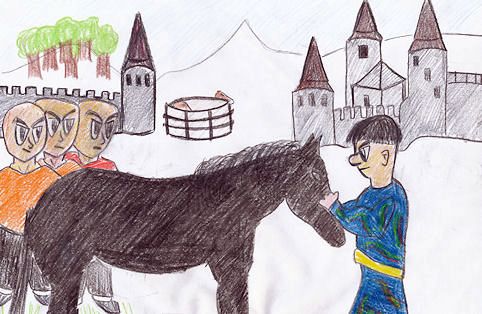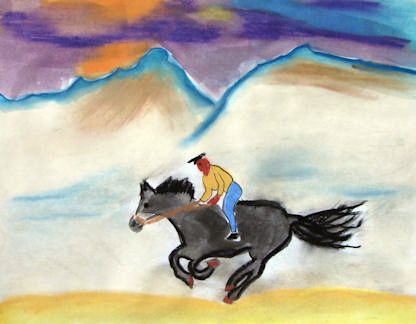
The princes agreed that all should use a particularly wild black horse.
Drawing by Peter Fu, Eleanor Roosevelt College (UCSD), Class of 2011, by permission
In the foothills of the Himalayas a prince didn't just get married. First he had to prove himself in horsemanship, swordsmanship, and shooting a bow and arrow. And other princes had to try to beat him so that he could prove he was the worthiest to marry the intended bride.
Xīdá-duō had to prove himself in the arts of war on the plain of Jiāpí-luó just as any other prince would need to do. Riding his favorite white horse Jiānzhì, the King of Horses, he easily exceeded all others in horsemanship. And he shot an arrow even further than Prince Típó-dáduō, his cousin and constant rival. When Xīdá-duō demonstrated swordsmanship, he slashed a tree so quickly and accurately that the top remained standing on the base until pushed over by a breeze.

But some grumbled that he had done well riding because of his magnificent white horse, not because of his own skill. So the princes agreed that all should use a particularly wild black horse. One after another, the black horse threw the princes who tried to ride it till it came to Prince Ēlā-chūn 阿拉春, an excellent rider who managed to mount and stay mounted, and even whipped the horse to make it go faster. Suddenly the horse bucked wildly and threw off the prince, and he received a mortal injury.
Now it was Prince Xīdá-duō's turn. Everyone thought Ēlā-chūn was the land's best rider, so all expected the horse to make short work of Xīdá-duō, just as it had of earlier princes. But Xīdá-duō went up to the horse, stroked it, and whispered soothingly into its ear. It calmed down, and Xīdá-duō mounted and rode the black horse with ease. And he had no need of a whip.
As expected, Xīdá-duō was judged the worthiest to become the husband of Princess Yéshū-tuóluó, and her father King Shànluó was delighted.

And so Prince Xīdá-duō and Princess Yéshū-tuóluó were united. They lived in the three beautiful palaces that King Jìngfàn had built for Xīdá-duō. And King Jìngfàn was confident that Prince Xīdá-duō would never again want to leave his family and become an ascetic, now that he had a beautiful wife.
But just to be sure, King Jìngfàn ordered that no one was ever to mention in the presence of the prince any sad or painful thing, such as birth, old age, illness, death (shēng-lǎo-bìng-sǐ 生老病死), or anything similar. Xīdá-duō's days were to be filled with song and dance, and he was to be screened from all sadness.
The king also ordered that a great wall be built around the whole great estate, and that only the young and the beautiful should be allowed inside. Anyone who might accidentally be hurt should immediately be sent out and not be allowed back till the healing was complete. And under no circumstance was the prince to go outside the wall.